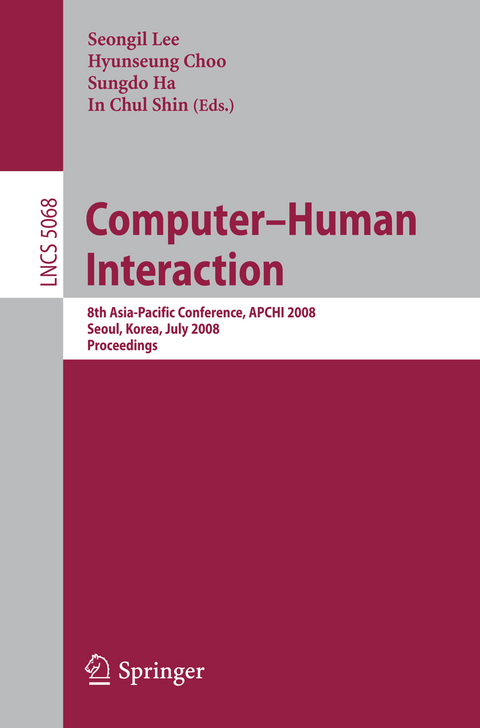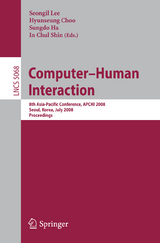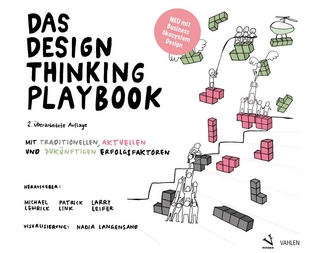Computer-Human Interaction
Springer Berlin (Verlag)
978-3-540-70584-0 (ISBN)
Ubiquitous Computing.- Experience of Enhancing the Space Sensing of Networked Robots Using Atlas Service-Oriented Architecture.- A Formal Model of Coordination for Supporting Community Computing in a Ubiquitous Environment.- A User-Centered Approach for Ubiquitous Service Evaluation: An Evaluation Metrics Focused on Human-System Interaction Capability.- On Generating Backbone Trees through Robust Multi-hop Clusters in Wireless Sensor Networks.- Denial of Sleeping: Performance Analysis and Counteracting Strategy.- Groupware.- Eye, Robot: A Network Control System for Ophthalmologic Examination.- A Study of a Loosely-Coupled Groupware System for Supporting Collaboration and Coordination.- RIKI: A Wiki-Based Knowledge Sharing System for Collaborative Research Projects.- Intelligent System Design.- Unconsciously Harmonized Online Communication Based on Uninterruptibility Estimation of Interaction Partners.- A Novel Web Page Analysis Method for Efficient Reasoning of User Preference.- Mood and Recommendations: On Non-cognitive Mood Inducers for High Quality Recommendation.- Intelligent Information System Based on a Speech Web Using Fuzzy Association Rule Mining.- Restaurant Recommendation for Group of People in Mobile Environments Using Probabilistic Multi-criteria Decision Making.- Human-Robot Interaction.- Augmented Reality Based Vision System for Network Based Mobile Robot.- Embedded Robot Operating Systems for Human-Robot Interaction.- A User Interface Transmission System for Public Robots.- Development of a WS-ECA Rule Management System for a Healthcare Robot.- Virtual/Augmented Environment.- Making Reading Experience Rich with Augmented Book Cover and Bookmark.- SPATIAL POEM: A New Type of Experimental Visual Interaction in 3D Virtual Environment.- Human Genome Data Visualization Using a Wall Type Display.- An Experience with Augmenting a Mirror as a Personal Ambient Display.- Vision-Based System.- Universal Video Adaptation Model for Contents Delivery in Ubiquitous Computing.- Selective Visual Attention System Based on Spatiotemporal Features.- A Technique for Displaying Presence Information on a Live Camera Image Using 3-D Mask Objects.- Background Subtraction Based on Local Orientation Histogram.- Relationship between Viewing Distance and Visual Fatigue in Relation to Feeling of Involvement.- Mobile Interaction Design.- Tactile Icon Design Using a Vibration Actuator in Mobile Devices.- Design of 3D Mobile Phones and Application for Visual Communication.- A Comparative Evaluation of User Preferences for Mobile Chat Usable Interface.- The Impact of Multimedia Extensions for Multimedia Applications on Mobile Computing Systems.- Novel Interaction Technique.- The Use of Photo Retrieval for EEG-Based Personal Identification.- Music Wall: A Tangible User Interface Using Tapping as an Interactive Technique.- Double-Crossing: A New Interaction Technique for Hand Gesture Interfaces.- Acquisition of Off-Screen Object by Predictive Jumping.- Hands-Free Input Interface Using Mimetic Muscle Movements for Wearable Computer.- Muscle Loadings While Using Finger as Input Device.- Design and Analysis of Conceptual Sketches Based on Context Awareness.- Accuracy of Velocity Perception Generated by Tactile Apparent Motion.- Usability.- A New Framework on Measuring Customer Perceived Value in Service Interface Design.- Novice Word Processor User Performance with Pictorial and Text Icons.- Exploring Factors That Make Online Interactive Games Successful: A Heuristic Approach.- Users' Perception and Usability Study of a Parser for Headings.- Developmentof Interactive Map-Based Tour Information System for Busan.- Web Accessibility.- Development of Image and Color Evaluation Algorithm for the Web Accessibility Evaluation Tools.- Longitudinal Study on Web Accessibility Compliance of Government Websites in Korea.- Korean Web Site Usability for Disabled People.- A Proxy-Based System for Translation of Internet Content into Specific Form.- The Elderly.- Extracting the Components of Elderly People's Capacity in Electrical Appliances and Grasping Relationship with the Components.- The Choice of Communication Media and the Use of Mobile Phone among Senior Users and Young Users.- Prototyping and Evaluation for Smart Home Controller Based on Chinese Families Behavior Analysis.- Mapping User Accessibility Needs Systematically to Universal Design Principles.
| Erscheint lt. Verlag | 24.6.2008 |
|---|---|
| Reihe/Serie | Information Systems and Applications, incl. Internet/Web, and HCI | Lecture Notes in Computer Science |
| Zusatzinfo | XV, 460 p. |
| Verlagsort | Berlin |
| Sprache | englisch |
| Maße | 155 x 235 mm |
| Gewicht | 730 g |
| Themenwelt | Mathematik / Informatik ► Informatik ► Betriebssysteme / Server |
| Informatik ► Software Entwicklung ► User Interfaces (HCI) | |
| Schlagworte | 3D • Accessibility • ambient display • Assistive Technology • augmented reality • Bayesian Network • Clustering • Collaborative Learning • Communication • Context Awareness • Decision Making • denial of service • disability Web usability • elderly people • embedded interaction • energy efficient • Groupware • handicaped people • Hardcover, Softcover / Informatik, EDV/Betriebssysteme, Benutzeroberflächen • HCI • HC/Informatik, EDV/Betriebssysteme, Benutzeroberflächen • Human Computer Interaction • Human-Computer Interaction (HCI) • Imaging • Information Visualization • input interface • Interaction Design • knowledge sharing • Load Balancing • Mobile Devices • Navigation • NLP • Personal Computer • personal identification • Pervasive Computing • Prototyping • proxy server • Recommender System • robot • robot interface • security • semantic wikis • Service-Oriented Architecture • spatiotemporal features • tactile interface • telemedicine • ubiquitous computing • Usability • User-Centered Design • User Interfaces • Virtual Reality • Visualization • wearable computing • web interfaces • wireless sensor networks |
| ISBN-10 | 3-540-70584-8 / 3540705848 |
| ISBN-13 | 978-3-540-70584-0 / 9783540705840 |
| Zustand | Neuware |
| Informationen gemäß Produktsicherheitsverordnung (GPSR) | |
| Haben Sie eine Frage zum Produkt? |
aus dem Bereich




